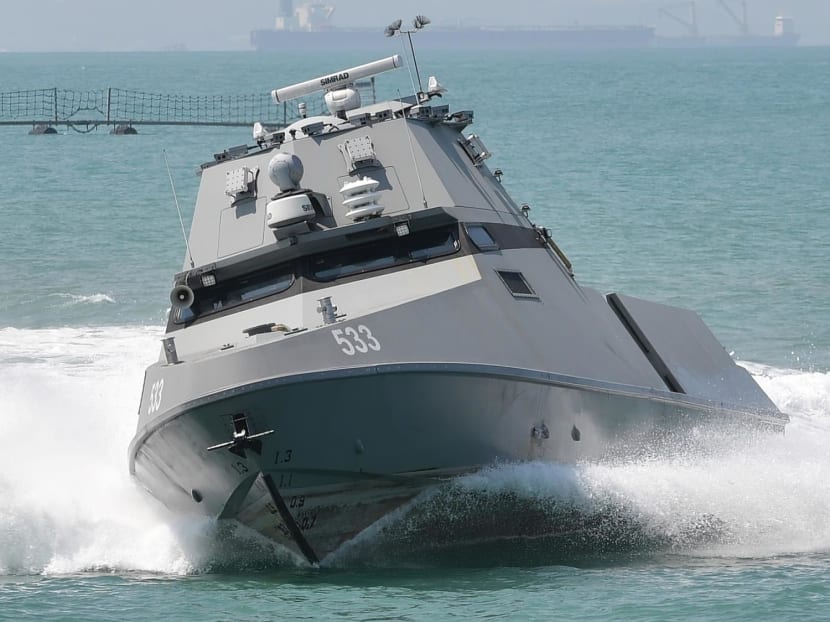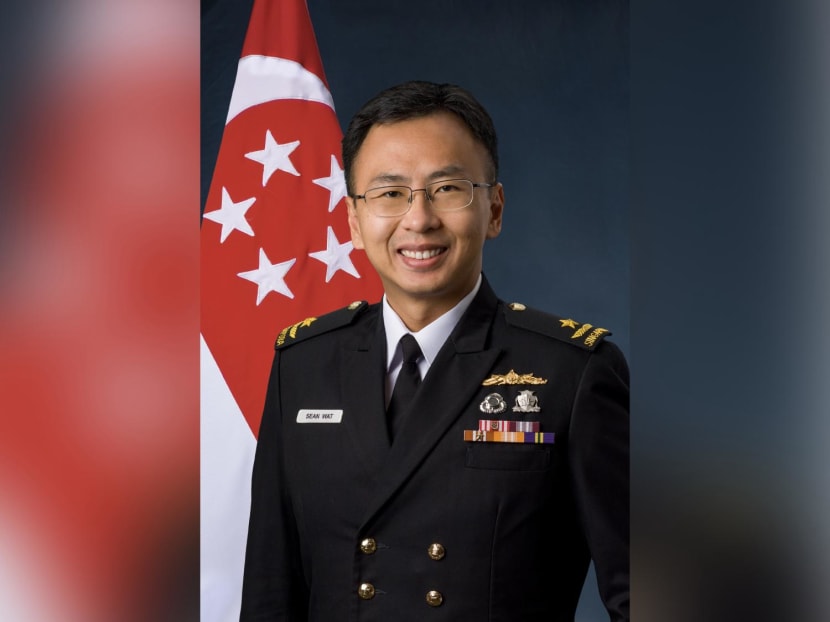Singapore Navy to use more of AI, unmanned tech as new chief urges young 'digital natives' to hop on board
SINGAPORE — Technology such as artificial intelligence (AI) and data analytics are being increasingly used in the operations of the Republic of Singapore Navy (RSN), its newly appointed chief said, as he urged digitally savvy young people to help “take the Navy into the future”.

A maritime security unmanned surface vessel (pictured) being used for autonomous patrols will enable the Republic of Singapore Navy to better conduct round-the-clock patrols and respond to maritime incidents more efficiently.
- The Republic of Singapore Navy is increasingly incorporating artificial intelligence and unmanned technology in its operations to help overcome manpower limitations
- The use of technology is also being explored as the Navy refreshes its assets
- The new Chief of Navy said that such advancements where needed cannot totally replace core functions such as complex decision making by the human mind
- He also said that as digital natives, young people can help steer the Navy in its ongoing transformation phase
SINGAPORE — Technology such as artificial intelligence (AI) and data analytics are being increasingly used in the operations of the Republic of Singapore Navy (RSN), its newly appointed chief said, as he urged digitally savvy young people to help “take the Navy into the future”.
Rear Admiral (RAdm) Sean Wat, who was appointed Chief of Navy on March 10, said that AI plays an active role in daily frontline operations “to more efficiently identify potential intruders from land and sea via our surveillance systems”.
Unmanned technology can help Singapore overcome its manpower limitations as well, he added.
However, it cannot replace core human functions such as leadership and complex decision making.
That is why, besides keeping up with technological and hardware advancements, RSN will also devote its attention to developing skills and expertise.
RAdm Wat was giving a written interview to the media on Tuesday (May 2), ahead of the biennial International Maritime Defence Exhibition and Conference (Imdex) Asia 2023 happening from May 3 to 5.
In the interview, he gave examples of how RSN, being a "small" navy, continuously transforms itself and incorporates new technologies to better achieve its mission.
On the part that AI plays, he said: “On board ships, we have also been experimenting with data analytics to help with predictive maintenance to help our engineers to maintain the operational readiness of our platforms.”
Incorporating such technologies “will be a key force enabler for our Navy” and it is therefore important to keep an open mind with regard to their adoption and implementation, he added.

The use of technology is also being explored as RSN refreshes its assets.
For example, it is “examining carefully” the requirements of the replacement platform for its landing ship tanks.
“The platform will be able to deploy unmanned systems and incorporate sense-making and automation to enable more efficient operations,” RAdm Wat said.
Separately, the design of its combat vessels may enable it to function on a “mothership” concept, where a manned vessel is able to operate several unmanned systems in order to expand its surveillance and influence.
“These multi-role combat vessels will support the operations of unmanned drones and vessels, which will be the key force multipliers for the RSN’s operations,” he added.
In terms of training, RSN personnel will be trained to operate and maximise the use of unmanned technology.
RSN also invests heavily in ensuring comprehensive, robust yet safe training for its sailors, RAdm Wat said.
On tapping unmanned technology, the Navy chief said that it "potentially unshackles us from the constraints imposed by declining birth rates" and "allows us to undertake riskier operations without putting our sailors in danger".
"(However), it cannot entirely replace core human functions that involve leadership, command, and complex decision-making."
At a broader level, RSN will continue its long-standing practice of taking part in bilateral and multilateral military exercises with other jurisdictions.
“These exercises are practical, tangible manifestations of the importance of the close and long-standing defence relations between Singapore and its foreign partners in contributing to a safe and secure maritime environment,” RAdm Wat said.
Events such as Imdex Asia, in its 13th edition this year, and the International Maritime Security Conference held in conjunction with it, also contribute to building trust through dialogue, he added.
All these efforts are critical to ensure RSN is ready to tackle the evolving nature of maritime challenges.
Navy chiefs, directors-general of coast guards and heads of maritime law enforcement agencies from 38 countries were among those who attended Imdex Asia's opening ceremony on Wednesday, Singapore's Ministry of Defence said in a statement.
YOUNG DIGITAL NATIVES ‘WELL-PLACED’ TO STEER NAVY AHEAD
In reply to TODAY’s questions, RAdm Wat said that competent and committed people will still need to helm the RSN’s transformation, alongside the use of technology to overcome manpower needs.
“As digital natives, the youths of today are well-placed to leverage emerging technology to help take the Navy into the future.”
On a personal note, he said that he had joined RSN in 2002 because he was “in love with the ships” and was drawn by the opportunity to see the world.
And RSN’s meaningful mission has gone a long way in sustaining his passion to this day, he added.
It offers a varied and exciting career proposition, with its variety of roles and different paths to attaining success in the service, and he urged young people seeking a meaningful career to consider joining the force.
“When I speak to young men and women considering a career in the Navy, that question of ‘purpose’ comes up very often,” he recounted.
“And I’m glad that I can tell them that in the Navy, we go to work knowing in no uncertain terms that what we do directly keeps Singapore and Singaporeans safe.”








